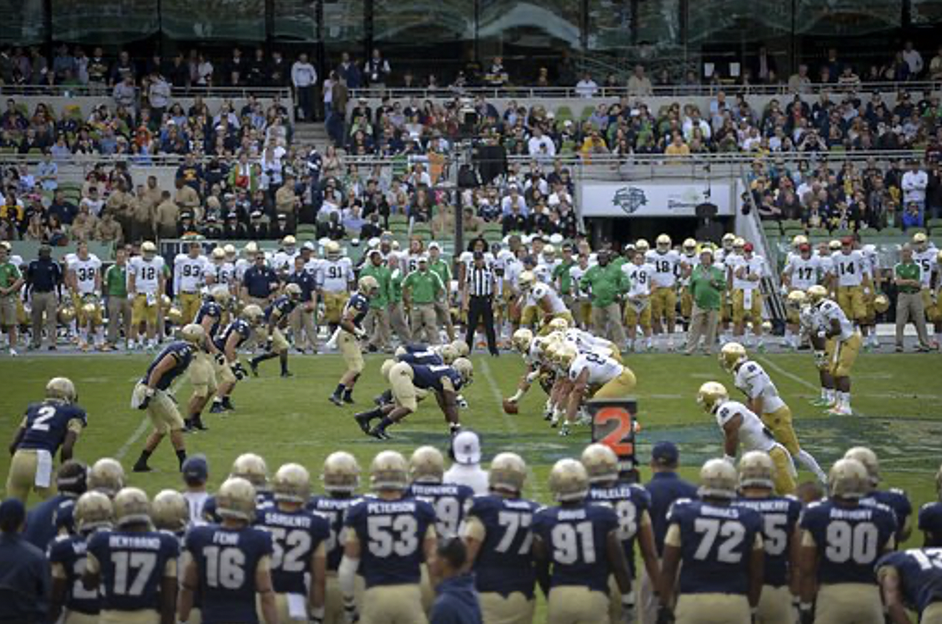By Edward Walsh, Staff Writer

The push for college athletes to be considered employees got a huge boost this past month. The U.S. Equal Employment Opportunity Commission (“EEOC”) could soon begin an investigation looking into whether NCAA Division I schools are discriminating against unpaid college athletes by failing to fairly compensate them.[1] The results of the investigation could result in unpaid student athletes being classified as “employees,” which would entitle them to compensation just like employees in other professions. The implications of this investigation could transform the $18 Billion dollar college sports industry by requiring student athletes to be paid.[2]
The EEOC’s investigation comes from a referral to the agency after the National College Players Association (“NCPA”) filed a discrimination complaint with the U.S. Department of Education’s Office of for Civil Rights (“OCR”) in March.[3] The NCPA alleges that all 350 NCAA Division I schools are violating Black students’ civil rights by capping their compensation. Currently, the NCAA caps the amount of educational assistance, through things like scholarships, an athlete can receive.[4] The NCPA alleges that this cap leads to a situation where athletes in sports consisting of predominantly white athletes like rowing and lacrosse are paid a greater percentage of the revenue they generate than athletes in predominantly Black dominated sports like men’s basketball and football. For example, women’s basketball players, a sport consisting of predominately white athletes, are paid 29.9% of the revenue they generate while men’s basketball and football players are only paid 8.9% and 8.1% of what they generate respectively.[5] This disparity leads to what the NCPA alleges is a violation of Title VII’s disparate impact doctrine, which says employers who have a racially neutral practice with a significant disparate impact must have a valid business justification to avoid liability.[6]
After three months of investigation the OCR sent a letter to the NCPA stating that it could no longer investigate because it believed it “lacked jurisdiction to investigate the claim.”[7] The OCR stated that while it had the authority to investigate claims of racial discrimination under Title VI it did not have the authority to investigate discrimination claims under Title VII.[8] In an interesting twist, the OCR referred the complaint to the EEOC who does have the authority to investigate racial discrimination claims for employees under Title VII. The OCR even assured the NCPA in the letter that they should expect the EEOC to contact them directly.
This move was unexpected because the OCR frequently dismisses complaints and is under no duty to refer complaints.[9] The EEOC receives up to 100,000 complaints a year and only investigates about 500 of them.[10] The referral of the complaint to the EEOC is a significant indication of how it views the merit of the complaint. According to Illinois law professor and labor law expert Michael LeRoy, this referral is an indication that the complaint is being taken “very seriously” and should be considered as a “big deal” for those who have fought for college athletes to be considered employees.[11]
The referral is also significant because of the legal context in which the complaint is considered. This is the first significant complaint filed since the US Supreme Court’s landmark ruling in NCAA v. Alston back in spring of 2021.[12]In that case Justice Kavanaugh wrote in his concurrence “Price-fixing labor is price-fixing labor…[t]he NCAA couches its arguments for not paying student athletes in innocuous labels. But the labels cannot disguise the reality: [t]he NCAA’s business model would be flatly illegal in almost any other industry in America.”[13] This seems to open the door for greater legal protections for college athletes. In addition to the Supreme Court’s opinion, the Biden Administration has expressed interest in addressing the issue of paying college athletes.[14]
No matter what the future might hold for the EEOC’s investigation, the voices calling for college athletes to be given greater protections are beginning to be heard by decisions makers. The implications of this investigation could have dramatic impacts on a multibillion-dollar industry not to mention the lives of thousands of college athletes across the country.[15]
[1] https://www.si.com/college/2022/09/15/ncaa-compensation-complaint-next-step-student-athlete-employees
[2] https://www.industryleadersmagazine.com/college-sports-is-multibillion-dollar-industry-in-the-us/
[3] https://www.si.com/college/2022/09/15/ncaa-compensation-complaint-next-step-student-athlete-employees
[4] https://swimswam.com/eeoc-reportedly-investigating-potential-discrimination-of-unpaid-college-athletes/
[5] https://www.sportico.com/leagues/college-sports/2022/eeoc-spells-trouble-for-ncaa-athlete-rights-complaint-1234689509/
[6] Id.
[7] https://www.si.com/college/2022/09/15/ncaa-compensation-complaint-next-step-student-athlete-employees
[8] Id.
[9] https://www.eeoc.gov/federal-sector/management-directive/chapter-5-agency-processing-formal-complaints
[10] https://www.sportico.com/leagues/college-sports/2022/eeoc-spells-trouble-for-ncaa-athlete-rights-complaint-1234689509/
[11] [11] https://www.si.com/college/2022/09/15/ncaa-compensation-complaint-next-step-student-athlete-employees
[12] NCAA v. Alston, 210 L. Ed. 2d 314 (2021)
[13] Id. at 345
[14] https://www.sportico.com/leagues/college-sports/2022/eeoc-spells-trouble-for-ncaa-athlete-rights-complaint-1234689509/
[15] https://www.industryleadersmagazine.com/college-sports-is-multibillion-dollar-industry-in-the-us/